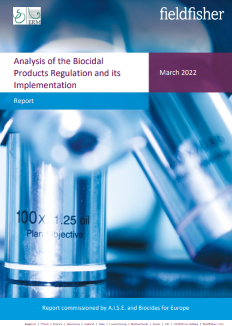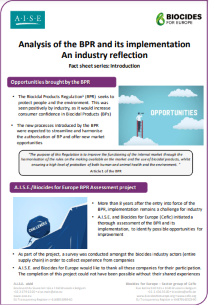A biocide is a product that is intended to protect people and animals against harmful organisms such as viruses, bacteria, insects, rodents. Biocidal products contain one or more substances called ‘active substance’, used specifically to repel, control or destroy those harmful organisms that could negatively impact our health.
Biocides are important for our good health

Infection in humans can spread fast if harmful microorganisms are not killed. Examples of recent outbreaks include COVID 19, where the rapid transmission of a rapidly mutating virus led to a pandemic situation. A strict hygiene regime is essential to break the ‘chain of infection’ before it enters the human body.
Breaking the chain begins with good cleaning and disinfection habits and is essential at home and in industrial and healthcare environments. The growing presence of insects transmitting critical diseases such as malaria or Lyme disease also highlights the crucial need for insect control products.
- Disinfectants are biocidal products. They act to prevent and eliminate bacteria that may otherwise build up on surfaces – such as kitchens and bathrooms, in healthcare settings or industrial environments such as food factories to prevent the spread of infectious diseases. The A.I.S.E. product portfolio includes biocides such as hand, general surface, and laundry disinfectants. In some circumstances, disinfectants are needed at home. In professional settings, their use is subject to detailed standards and requirements so as to ensure the hygiene and safety of the agricultural, food and catering chains, or again the medical and healthcare sectors. Read more about hygiene at home and outside the home.
- Insect repellents and insecticides are also biocidal products within the A.I.S.E. product portfolio. They are crucial in protecting against infection, infestation and insect-transmitted disease in and around our homes, healthcare facilities and other institutional settings in Europe. Read more about repellents and insecticides.
- Preservatives: Biocides are in some cases added to products such as detergents, cosmetics, personal care products, and paints to prevent the growth of bacteria, fungi, and other microorganisms, thereby extending the shelf life of these products. Read more about the need for preservatives in detergent products.
How are biocides regulated in the EU?
In Europe, biocidal products are governed by the Biocidal Products Regulation (EU No 528/2012) which came into force in 2013 and regulates biocidal products in a harmonised way across the EU to ensure that they are safe to place on the market. BPR ensures that biocidal products comply with strict requirements related to human, animal and environmental protection, as well as efficacy, and have to be authorised by a Member State Competent Authority or by the EU Commission before their placing on the market.
The BPR has several key features and objectives:
- Active substance approval: The BPR establishes a list of approved active substances that can be used in biocidal products. Before an active substance is included in this list, it undergoes a rigorous evaluation process to ensure it meets the necessary criteria.
- Product authorisation: Under the BPR, biocidal products must undergo a thorough authorisation process before they can be placed on the market. This involves assessing the product formulations for their efficacy, safety, and environmental impact, based on data provided by the companies seeking authorisation.
- Product types: Biocidal products are categorised into different types based on their intended use and each product type (PT) has specific requirements and evaluation criteria. A.I.S.E.’s portfolio includes disinfectants (PT 1-5) and insecticides and repellents (PT 18-19).
Challenges for the industry to implement the BPR
Concepts introduced by the BPR, in particular Biocidal Product Families, Same Biocidal Product and Union Authorisations, have provided industry with new ways to bring biocidal products on the market, which could potentially allow them to reduce the costs and administrative burdens associated with obtaining product authorisations, and thus facilitate the placing on the market of the biocidal products. The BPR’s increased focus on human and environmental protection is also recognised as a significant achievement because it increases consumer trust in biocidal products placed on the market. At the same time, several issues with the application of the BPR have been identified, which have introduced significant complexity and unpredictability into what is an already complex regime.
A.I.S.E., together with Biocides for Europe have analysed the functioning of the BPR and identified strengths, weaknesses and potential opportunities for improvement. The industry’s joint report includes a series of recommendations to ensure that biocides continue to serve society’s needs in a safe and timely way.



